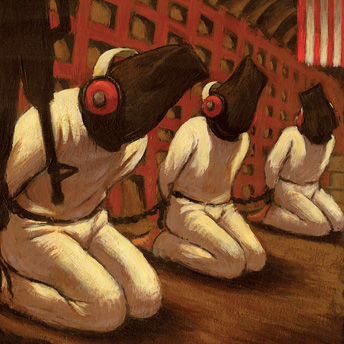
|
| Depiction of torture (sensory deprivation) at Guantanamo Bay [image: ib economics weblog] |
Okay, sorry for the misleading title. Of course torture can only make obtaining useful information during interrogations more difficult, not less. But, don’t take my word for it – take Michael Sulick’s, high-ranking intelligence official at the head of the CIA’s National Clandestine Service, instead:
When asked if the Obama administration’s ban on waterboarding has had serious consequences on the war against terror, Sulick answered in general terms.
“I don’t think we’ve suffered at all from an intelligence standpoint,” he said, “but I don’t want to talk about [it from] a legal, moral or ethical standpoint.”
We already know from first-hand accounts by interrogators themselves that applying coercion and pain to suspected terrorists only makes things harder for everyone, whereas carefully calculated and informed (and non-invasive) approaches generally tend to garner the best results by far. The use of torture by the US government and military isn’t just a horrendous blight on the US’s record and collective conscience, it’s an embarrassing exercise in futility as well.






![There is probably no [superstition]. Now stop worrying and enjoy your life There is probably no [superstition]. Now stop worrying and enjoy your life](http://i.imgur.com/Rk57v.gif)
![Joé McKen (18) [taken 07/13/10] Joé McKen (18) [taken 07/13/10]](http://i.imgur.com/2wvlR.jpg)

